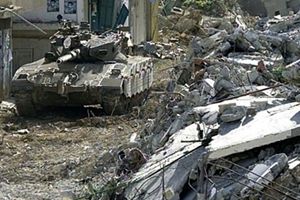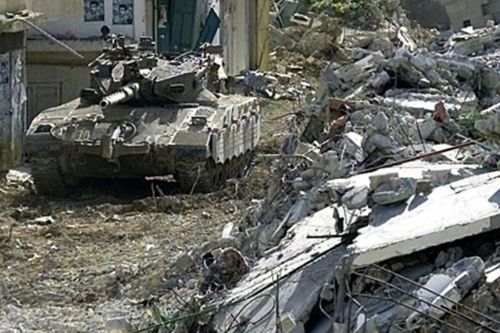
The “Jenin, Jenin Amendment” passed a preliminary vote last week in the Knesset plenary. Under the proposed legislation, “defamation against the operational activities of IDF soldiers” would constitute grounds for combat soldiers to pursue civil lawsuits. According to Hadash “The Jenin, Jenin Law is dangerous and anti-democratic and the proposed amendment to public defamation law would create a private right of action for otherwise anonymous soldiers to sue critics of the Israeli military. The ACRI (Association for Civil Rights in Israel) also voiced its staunch opposition to the proposed amendment in a letter sent to all members of Knesset.
In April 2002, occupation forces invaded a Palestinian refugee camp in Jenin. The Israeli military refused to allow journalists and human rights organizations into the camp for “safety reasons” during the fighting, leading to a rapid cycle of rumors that a massacre had occurred. Jenin remained sealed for days after the invasion. 10% of the camp was destroyed and over 50 people were killed. UN fact-finding mission was not allowed by Israeli to enter Jenin.
The bill was tabled as a reaction to the 2002 film directed by Mohammed Bakri and a Supreme Court decision that rejected a defamation suit filed against Bakri by a group of soldiers who served in Jenin. According to the bill’s explanatory notes, the proposed amendment to the public defamation law is necessary in order to prevent “serious harm caused to IDF combat soldiers who are left without any possibility to defend their good names.” But in Jenin, Jenin the Supreme Court reached the conclusion that the film’s defamation of a “group of combat soldiers” did not defame any of the soldiers personally.
Bakri participated in a Hadash nonviolent demonstration at a checkpoint during Israel’s 2002 invasion of Jenin and was shocked when Israeli soldiers shot at the crowd, wounding a fellow actor standing next to him. He tells audiences that this experience inspired him to sneak into Jenin with a camera and ask residents, “What happened?” The result was the documentary Jenin, Jenin, featuring a range of testimonies which suggested that a massacre had indeed occurred. Bakri gave voice to Palestinians which would not reach the media due to the sealing of the city; as a result he chose not to interview Israeli officials for the film.
According to the amendment’s explanatory notes, its purpose is to prevent “serious harm caused to Israel by false accusations leveled against the IDF.” Recruiting combat soldiers in an effort to exploit their personal rights as tools in a propaganda war is improper and unconstitutional. The proposed amendment will now go to committee in preparation for a first reading.



